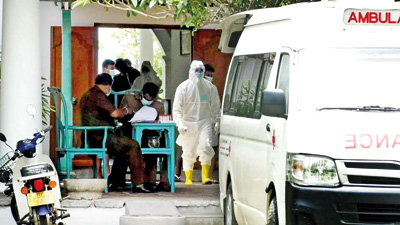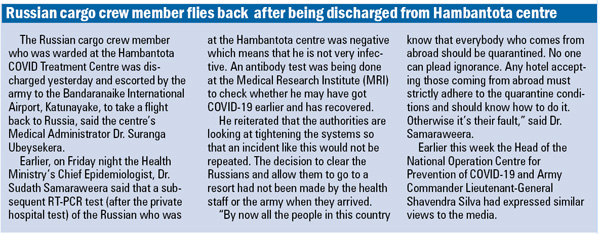News
A “mistake” that could have set off a COVID-19 time-bomb in country
Was there a system failure in Sri Lanka’s meticulous plans to contain the COVID-19 virus from leaking into the community through those arriving from abroad?
In a near-miss which could have set off a COVID-19 time-bomb, the vital questions being raised are:

Earlier in the week: An ambulance arrives at the hotel in Matara to take the Russian cargo crew member to hospital. Pic by Jeewaka Jayaruk
- How did 15 Russian crew members of a cargo plane walk out of the Mattala Rajapaksa International Airport (MRIA) without following the stringent protocols set for all arrivals from abroad?
- Why was the crew which had come for a ‘rest period’ not quarantined?
- How did the crew go to a hotel in Matara which was not a designated quarantine centre?
- How did some crew members leave that hotel to roam around the town and supermarkets?
- How did the foreigners remain under the radar from September 13 to 23?
- Is there no chain of command and division of duties at airports and ports, the crucial entry-points through which COVID-19 can slip in to the country?
The Russian cargo flight (Aurora Airlines) had arrived first at the Bandaranaike International Airport (BIA), Katunayake, then gone to Bangalore, India, returned to the BIA and finally gone on to the MRIA, the Sunday Times found. Attempts to find out where the flight was departing to, failed but one source said he thought it was headed to China.
“We take collective responsibility with regard to what happened as everyone has to take responsibility when something goes wrong. We can’t point fingers as this is a problem that concerns the whole country and we will sort it out collectively,” said Airport & Aviation Services Limited (AASL) Chairman (Retd.) Major-General G.A. Chandrasiri, explaining that it was a “small mistake” in certain written documentation which led to this oversight taking place.
Conceding that it is a serious issue and that is why they rectified it immediately, he stressed that in the future nobody, be it from the repatriation programme, seafarers’ programme or pilot or crew programmes can leave the airport without being screened, checked and escorted. In the future, if something like this happens again, someone will have to take sole responsibility.
Numerous sources that the Sunday Times spoke to, however, did not consider the Matara incident a small mistake but stressed that it could have turned into a COVID-19 time bomb, sending Sri Lanka down a slippery slope.
So many months (nearly nine months) into the COVID-19 pandemic, how can there be documentation errors, others questioned, urging an impartial and thorough investigation with those responsible for this major faux pas being brought to book.
According to Mr. Chandrasiri there was an error in the written documentation. It was a procedural error that has now been rectified. It was basically a documentation error, as it had not indicated certain responsibilities leading to this lapse.
“There are certain lapses in the written documentation and the responsibilities of the organisations and we rectified this entire situation. As a result of that only this error has taken place. We went there and sorted it out and now documentation-wise it is okay and the Civil Aviation Authority has issued a directive of where it has gone wrong and they have corrected everyone,” he said.
A team had gone to the MRIA the same night and discussed the entire process the next morning.
“Later we found out who was responsible for the mistake. In future, nothing will go wrong as we have rectified what happened and identified what went wrong. Fortunately, the Russian crew member tested negative three times and it’s a relief to the country,” Mr Chandrasiri said.
The Matara controversy surged around the Amaloh Beach Boutique Resort in Polhena, as it had lodged the 15 Russian crew after they arrived at the MRIA on September 13. It was when one of tested positive on Wednesday (September 23), having got the test done on their own from a private hospital as they were hoping to leave Sri Lanka the next day, that the authorities found that no set protocols set for those arriving from abroad had been followed.
It was then that fear and panic spread that Matara would go under lockdown as four Russians had visited a supermarket and the staff of the resort had been going home in-between without keeping to quarantine regulations themselves as required by hotels lodging people coming in from abroad, both local and foreign.
Buck-passing was also witnessed in this major issue, with some officials refusing to speak point blank, not answering their phones or putting the blame on others, as sources pointed out there seems to be much confusion in the documents covering the arrival of airline crews from abroad,
An MRIA source said that when anyone arrives at the airport, the processes followed are the Health Ministry health protocols which are implemented by the Health Office falling under the mandate of the ministry’s Quarantine Unit.
“We perform disinfection, then carry out an on-arrival RT-PCR test and send the crew to the Health Office where the Health Declaration Forms are signed. These forms contain the details of where the crew will be staying and the number of days they will be staying there,” the source said, explaining that the airline crew and the handling agent will decide where they would be staying. The chosen hotel will inform the area’s Medical Officer of Health (MOH) who then has to coordinate with the hotel.
Airport officials do not know which hotel they go to as it is handled by the Health Office, the source said, adding that the Russians’ on-arrival RT-PCR tests were negative.
Many attempts by the Sunday Times to contact the Health Ministry’s Quarantine Unit proved futile.
Don’t make us the scapegoats, says hotel owner
When contacted, the owner of the 20-room Amaloh Beach Boutique Resort, Chamara Perera, urged that the resort should not be made the scapegoat for a failure on the part of the authorities to prevent what could have turned into a COVID-19 disaster.
Reiterating that they followed every possible measure, he said that it was when the armed forces surrounded his resort on Wednesday evening (September 23) that they realized that something had gone wrong.
On the part of the resort, when the room-booking inquiry for the Russian crew (seven pilots and eight engineers) came from an agent about a week before the guests arrived with the assurance that they had been ‘cleared to enter the country’, the hotel contacted the MRIA Airport Manager. He told them that the foreigners had all clearances and permission to land. There was also no need to follow quarantine procedures. The booking confirmation came a few days before the Russians’ arrival.
As the resort was not a hotel quarantine centre, with these assurances they treated the Russians like any walk-in foreigners who had been cleared by the authorities, he said, pointing out that the resort did call the PHI office in Matara on September 12 (for which they have the phone log), about the Russians and were told to follow standard procedures of hand-hygiene, face-mask wearing and keeping social distance. There was no specific mention of anything else. The PHIs who usually visit the resort to check on health measures at other times simply did not come during the period the Russians were there.
Giving the sequence of events, Mr. Perera said: “The Russians arrived at 8 p.m. on September 13 in two small buses the hotel sent to the MRIA having walked out of the airport without any restriction. In fact, an airport official walked them to the hotel staff who had gone to pick them up. The hotel also received a call from the National Operations Centre for Prevention of COVID-19 outbreak, Rajagiriya (they have telephone records) that the centre was aware of the group staying at the hotel and to watch out for any symptoms of fever. There was also another call on the landline from the centre wanting to speak to the Captain of the Russian crew who was then called to the front office.
“However, the management decided to close the hotel for other guests by calling and cancelling all bookings, when the Russians who were supposed to stay for two days said that their departure had been delayed by another 10 days. Each crew member occupied an individual room and used the hotel and garden but not the swimming pool. During their stay, four of them (not the one who tested positive) went to a supermarket in two trishaws. He thought it was not wise but they were not told to restrict their movements as they were not under quarantine.”
The Public Health Inspectors’ Union President, Upul Rohana, however, said that they were not informed by any source regarding the stay of the Russians.
A health source at the ground-level in Matara said that they were not informed from anywhere regarding the Russians lodging in the area.
“If we were informed, we would have followed procedures and checked whether they were keeping to quarantine procedures. We got information on September 23 after one of the crew members tested positive,” the source added.
Around 150 people are in quarantine at the hotel as well as the Habaraduwa quarantine centre.


